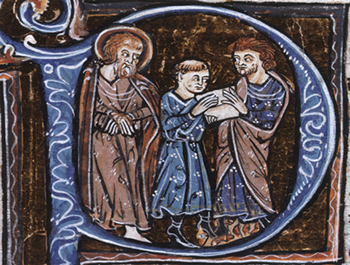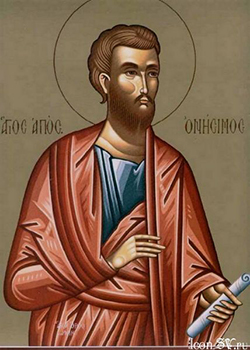From Our Archives
For earlier essays on this week's RCL texts, see Dan Clendenin, Listen to Your Life (2022); Debie Thomas, What It Will Cost You (2019); Dan Clendenin, Pay Up (2016); Beth Kawasaki, Fearfully and Wonderfully Made (2013); Bill McKibben, The Care of Creation: Choose Life for You and Your Children (2010); and Dan Clendenin, When the Fairest Cut is the Deepest: The Risk of Renunciation (2007); Choose Life! (2004).
This Week's Essay
By Amy Frykholm, who writes the lectionary essay every week for JWJ.
Philemon 1:12: “I am sending him, that is, my own heart, back to you.”
For Sunday September 7, 2025
Lectionary Readings (Revised Common Lectionary, Year C)
Psalm 139:1–6, 13–18 or Psalm 1
Philemon 1:1–21
Luke 14:25–33
Dear Onesimus,
Three hundred and thirty-five words, so carefully, with such exquisite diplomacy, written about you in one small letter. This letter has been printed in almost every collection of the Christian canon since the Moratoria Fragment in the late second century.
These words were not preserved, as far as I know, because of you and the terrible dilemma you faced, but because they were composed by your “brother” and “father” Paul. I don’t remember learning your name in Sunday school. When I look through my old church Bibles where I took notes from sermons and Bible studies, I see not one line or word underlined. I don’t remember ever reading Paul’s letter with attention or understanding. Despite Paul’s love for you, you didn’t exactly spend the last 20 centuries as a household biblical name.
But there you are: named, loved, and from the tone, perhaps taking a terrible risk by returning to your “owner," Philemon, with this letter.
You met Paul in a crowded, subterranean prison cell, “damp, moldy, and bitterly cold,” historian Candida Moss describes, with one window bringing in little light but plenty of draft. The two of you connected. Perhaps you heard from his lips words of freedom and hope, and during that time, you became “his heart” (Philemon 1:12).
It is even possible that you might have been helping Paul write this letter, an appeal for your greater “usefulness” (a pun on your own name!) as brother instead of slave. It would be more than a little ironic if this appeal was written with your own hand serving Paul’s voice. Maybe you told him about your former life with Philemon, about what it was like to be in his possession, to be yourself a possession. It was a surprise to me when I learned that enslaved people were often conscripted as secretaries in the ancient world, including by Paul. They were trained to read and write so that they could serve this purpose. I wonder if you were trained in this way. The Orthodox say that you later became a bishop, so perhaps there are other letters written in your own voice that are now lost to history.
|
|
|
Orthodox Icon of Onesimus.
|
The letter drips with irony, from Paul’s hyperbolic description of himself (sitting in a prison, an obvious prisoner of the state) as “a prisoner of Christ” (Philemon 1:1) to his “I could tell you what to do, but I won’t. I trust you to do the right thing” (paraphrase of 1:8-9). It is clear that Paul’s intention is to transform you, in Philemon’s mind and heart, from slave to brother (1:16), and that this is going to take some work.
Moss paints a vivid picture of Paul writing his letters from prison: “We might imagine that someone—perhaps the secretary of one of Paul’s wealthier followers, or perhaps a street-corner scribe hired for the day—squatted next to the window with stylus in hand and wax tablet balanced on his thigh, ready to take dictation.” Paul would have had to yell up to the tiny window, over the commotion, the words that he wanted to convey. Perhaps Paul had all the time in the world, pacing his cell, to compose his letters, but when the moment of dictation came, he had to be fast and clear.
There are so many things that we will never know about your story, and Paul so cleverly, perhaps for good reason, masks your desires. What were they? Could Paul help you get what you had not been able to attain on your own? What dangers were you facing when you arrived with this letter? Most sources think that you had fled Philemon's house, so when you returned to him and to his church, what kind of reception did you receive? It's not like you could hide at the back. Was Philemon angry or stunned or grateful? He could have had you immediately thrown back into prison. You could have been beaten or even killed. The risk you took takes my breath away.
 |
|
Decorated initial with Paul, Onesimus (delivering letter), and Philemon.
|
Wealthy Christians like Philemon would have been the exception rather than the rule. Your more common associates would have been other enslaved people along with artisans and fishermen. In the second century, Celsus wrote that Christians were “workers in wool and leather, fullers, and persons of the most uneducated and rustic character.” The one thing we know about you that we don’t know about the hundreds of enslaved others who delivered letters, tended the sick, organized logistics, and carried out thousands of other tasks is that Paul loved you, that he wanted your brotherhood and partnership, and that he either had to ask or command Philemon for these things.
As Paul became the leader of a wider and more diverse circle of Christians, he seemed to be trying to discern what his authority meant. In the upside-down world that Christ had initiated, what were poor and rich, enslaved, slave-owning, and free men and women supposed to do? How were they supposed to behave? Who got to order whom around when all were enslaved to Christ? What order did this new world have?
In the Gospel of Luke (14:25-33), Jesus demands that his followers surrender everything: their titles, their riches, their social standing, their very identities. When they do this, if they do this, then Philemon becomes just like you. If nothing else, this letter you carried is a fascinating snapshot of the ferment taking place as everyone tried to understand what this gospel meant for all.
 |
|
Saint Onesimus.
|
As I listen to your story from the distance of half a world and 2000 years, I look around at my own society that is obsessed with the question of freedom. I see freedom celebrated on television commercial after television commercial. I hear that freedom is protected by wars and fought for in courtrooms. Even as the word is bandied about for political purposes, I myself cherish it so much that I might even be anachronistically reading my own desire into your story. The word “freedom” never appears in this letter, even though it seems to be the letter’s unspoken longing.
Human freedom is terrifying, the novelist and critic Toni Morrison writes. And maybe that terror leads us to enslave ourselves and each other in various ways—to addictions and compulsions, to any guru with a book to sell, to governments who promise to keep us safe, if we’ll just surrender our freedom to them. The dilemma that you faced, as an enslaved person trying to live into the freedom of Christ’s promises, has certainly changed in all of these centuries, but I don’t know if it’s become any easier.
Your sister,
Amy
*This meditation was inspired and informed by historian Candida Moss’s book God’s Ghostwriters: Enslaved Christians and the Making of the Bible (Little, Brown & Co., 2024).
Weekly Prayer
Rainer Maria Rilke (1875–1926)
You, God, who live next door—
If at times, through the long night, I trouble you
with my urgent knocking—
this is why: I hear you breathe so seldom.
I know you’re all alone in that room.
If you should be thirsty, there’s no one
to get you a glass of water.
I wait listening, always. Just give me a sign!
I’m right here.As it happens, the wall between us
is very thin. Why couldn’t a cry
from one of us
break it down? It would crumble
easily,it would barely make a sound.
Translated by Anita Barrows and Joanna Macy
Rainer Maria Rilke (1875–1926) was an Austrian poet whose poems often express a longing for God. This poem comes from Rilke’s Book of Hours where he tries to convey an intimacy and reciprocity between the divine and the ordinary (Riverhead, 2005), 53.
Amy Frykholm: amy@journeywithjesus.net
Image credits: (1) Orthodox Church in America and (2, 3) Wikipedia.org.





